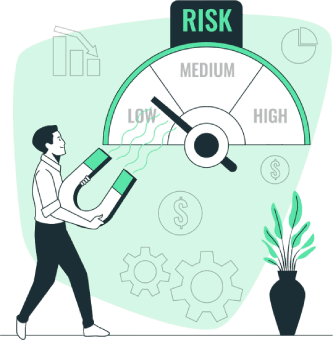Understanding the Psychology of Risk and Decision-Making
Risk-taking behaviors and decisions refer to actions that tend to cause harm to the person taking them or other people. Scientists believe there is a science behind these actions. They believe socioeconomic and cognitive factors affect how we make risky decisions.
There has not been enough research to determine the influence of emotional and hormonal factors. However, our team at Cognitive View has studied how psychological factors affect risky behaviors. This article will delve into the results of our studies.
Examples of Risk-Taking

There are numerous examples of risk-taking behavior. Some behaviors have the potential to cause more harm than others. Some examples may also involve making more than one risky decision at a time. Let’s take a look at some risk-taking examples:
- Criminal activities like stealing, trespassing, and vandalism
- Participating in dangerous sports that could cause injury or death.
- Investing in schemes you have inadequate knowledge about
- Driving under the influence of alcohol or drugs
- Skipping school to participate in irresponsible activities.
- Gambling and betting more than you can afford to lose
Even widely practiced activities like drinking and smoking are risk-taking behaviors. They have the potential to cause significant damage. Risk-takers still choose to ignore these damages. That is why it is important to understand the science of risk-taking.
Emotions and Cognitions Affect Risky Behavior
For a long time, scientists have focused on how psychological and economic factors affect risky behavior. They have not holistically studied the effects of hormonal, content, emotional, and contextual factors. The following sections in this article will address this gap based on evidence. Let’s get into it!
How Decision Context, Content, and Experience Affect Risky Behaviors
Studies evaluating human risky behaviors usually invite people to choose between an uncertain option and a certain one. According to tasks with hypothetical monetary gambles, these studies suggest that two psychological factors affect risky human decisions.
The two psychological factors depend on the emotions accompanying the uncertain and specific options. However, recent studies have shown that the behavioral effects of decision-making rely greatly on experience and memory.
It is also important to note that humans experience decision-making data instead of relying on the data. For example, risky activities in the real world are experienced in an order and usually without context.
How Emotions Affect Risky Behavior
This section will focus on how emotions affect decision-making. We will also provide research to support our opinions. Most studies focus on self-evident assumptions about decision-making. However, recent studies from psychology and neuroscience have shown that human emotions affect risky behavior.
According to Loewenstein and Lerner (2003), to understand the science behind risky decisions, you must first understand how emotions affect decision-making. Loewenstein and Lerner also classified emotion-decision as immediate or anticipated emotions.
Anticipated emotions refer to the feelings people expect to feel after making a decision. On the other hand, immediate emotions include all the affective states you experience when deciding. Identifying these differences will help you understand how emotions affect decision-making.
Effects of Hormones on Risk Taking

The effects of hormones on risk-taking correlate with changes in your environment. Dickerson and Kemeny, in 2004, did a study that highlighted the effects of cortisol levels on decision-making. Their analysis showed that our ability to take risks directly correlates with our emotions.
The release of corticotropin-releasing hormone triggers the hypothalamic-pituitary-adrenocortical axis—the release of adrenocorticotropic hormone from the anterior pituitary gland results in cortisol secretion.
According to Selye’s studies in 1956, the activation of the hypothalamic-pituitary-adrenocortical axis causes a series of psychological changes that affect decision-making.
Conclusion
Despite the damages associated with risk-taking, people still engage in risk-taking behaviors. This has led scientists to believe there is a science behind risky decisions and behaviors. Studies and research prove how emotions, context, experience, and cognition affect risk-taking. We highlighted some in this article on Cognition View and hope you now understand better.
In case you missed
You’re not in control of your decisions.
— Michael Anderson (@Slothenater) March 29, 2025
This Nobel Prize winner spent 37+ years proving it.
He exposed a psychological flaw in human decision-making.
Once you see it, you can’t unsee it.
And you'll question every decision you've ever made: 🧵 pic.twitter.com/z4AsEt8hYF

